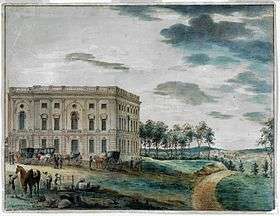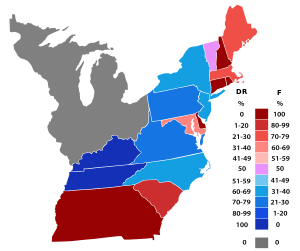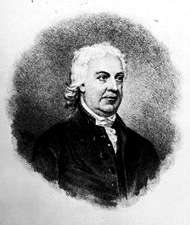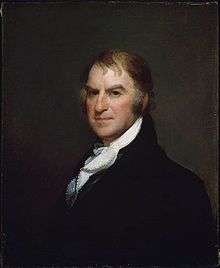6th United States Congress
| 6th United States Congress | |
|---|---|
|
5th ← → 7th | |
 United States Capitol (1800) | |
| March 4, 1799 – March 4, 1801 | |
| Senate President | Thomas Jefferson (DR) |
| Senate Pres. pro tem |
Samuel Livermore (F) Uriah Tracy (F) John E. Howard (F) James Hillhouse (F) |
| House Speaker | Theodore Sedgwick (F) |
| Members |
32 senators 106 representatives 1 non-voting delegates |
| Senate Majority | Federalist |
| House Majority | Federalist |
| Sessions | |
|
1st: December 2, 1799 – May 14, 1800 (Philadelphia) 2nd: November 17, 1800 – March 3, 1801 (Washington, D.C.) | |
The Sixth United States Congress was a meeting of the legislative branch of the United States federal government, consisting of the United States Senate and the United States House of Representatives. It met at Congress Hall in Philadelphia, Pennsylvania and in Washington, D.C. from March 4, 1799, to March 4, 1801, during the last two years of John Adams's presidency. It was the last Congress of the 18th century and the first to convene in the 19th. The apportionment of seats in House of Representatives was based on the First Census of the United States in 1790. Both chambers had a Federalist majority. This was the last Congress in which the Federalist Party controlled the presidency or either chamber of Congress.
Major events
- December 14, 1799: Former President George Washington died
- February 24, 1800: Library of Congress founded
- November 17, 1800: Congress held its first session in Washington, D.C.
- January 20, 1801: John Marshall was appointed Chief Justice of the United States
- February 17, 1801: United States presidential election, 1800: Thomas Jefferson became the first President of the United States elected by the House of Representatives as no candidate received a majority of the electoral votes cast in the 1800 presidential election. The House was required to choose between Jefferson and Aaron Burr, with each of the 16 states having a single vote. Jefferson was elected on the 36th ballot by 10 to 4 (with 2 abstentions).[1]
States for Jefferson States for Burr States casting blank ballots - Georgia
- Kentucky
- Maryland
- New Jersey
- New York
- North Carolina
- Pennsylvania
- Tennessee
- Vermont
- Virginia
- Connecticut
- Massachusetts
- New Hampshire
- Rhode Island
- Delaware
- South Carolina
Total: 10 (63%) Total: 4 (25%) Total: 2 (12%)
Major legislation
- February 13, 1801: Judiciary Act of 1801, Sess. 2, ch. 4, 2 Stat. 89
- February 27, 1801: District of Columbia Organic Act of 1801, Sess.2, ch. 15, 2 Stat. 103
Territories organized
- July 4, 1800: Indiana Territory created from a portion of the Northwest Territory.
Party summary
The count below identifies party affiliations at the beginning of the first session of this Congress, and includes members from vacancies and newly admitted states, when they were first seated. Changes resulting from subsequent replacements are shown below in the "Changes in membership" section.
Senate
| Party (shading shows control) |
Total | Vacant | ||
|---|---|---|---|---|
| Democratic- Republican (DR) |
Federalist (F) | |||
| End of the previous congress | 9 | 22 | 31 | 1 |
| Begin | 9 | 22 | 31 | 1 |
| End | 11 | 21 | 32 | 0 |
| Final voting share | 34.4% | 65.6% | ||
| Beginning of the next congress | 15 | 17 | 32 | 0 |
House of Representatives

| Party (shading shows control) |
Total | Vacant | ||
|---|---|---|---|---|
| Democratic- Republican (DR) |
Federalist (F) | |||
| End of the previous congress | 50 | 56 | 106 | 0 |
| Begin | 46 | 60 | 106 | 0 |
| End | 49 | 56 | 105 | 1 |
| Final voting share | 46.7% | 53.3% | ||
| Beginning of the next congress | 72 | 33 | 105 | 1 |
Leadership
.jpg)

Samuel Livermore
Senate
- President: Thomas Jefferson (DR)
- President pro tempore: Samuel Livermore (F), elected December 2, 1799
- Uriah Tracy (F), elected May 14, 1800
- John E. Howard, (F), elected November 21, 1800
- James Hillhouse, (F), elected February 28, 1801
House of Representatives
- Speaker: Theodore Sedgwick (F)
Members
This list is arranged by chamber, then by state. Senators are listed by Class, and Representatives are listed by district.
Senate
Senators were elected by the state legislatures every two years, with one-third beginning new six-year terms with each Congress. Preceding the names in the list below are Senate class numbers, which indicate the cycle of their election. In this Congress, Class 1 meant their term began in the last Congress, requiring re-election in 1802; Class 2 meant their term began in this Congress, requiring re-election in 1804; and Class 3 meant their term ended with this Congress, requiring re-election in 1800.
House of Representatives
The names of members of the House of Representatives elected statewide on the general ticket or otherwise at-large, are preceded by an "At-large," and the names of those elected from districts, whether plural or single member, are preceded by their district numbers.
Changes in membership
The count below reflects changes from the beginning of the first session of this Congress
Senate
There were 7 resignations and 1 vacancy at the beginning of Congress. The Federalists had a 1-seat net loss and the Democratic-Republicans had a 2-seat net gain.
| State (class) |
Vacator | Reason for change | Successor | Date of successor's formal installation |
|---|---|---|---|---|
| Virginia (2) |
Vacant | Henry Tazewell (DR) died before the beginning of this Congress | Wilson C. Nicholas (DR) | Elected December 5, 1799 |
| New York (1) |
James Watson (F) | Resigned March 19, 1800 | Gouverneur Morris (F) | Elected April 3, 1800 |
| Massachusetts (2) |
Samuel Dexter (F) | Resigned May 30, 1800 | Dwight Foster (F) | Elected June 6, 1800 |
| New York (3) |
John Laurance (F) | Resigned sometime in August, 1800 | John Armstrong (DR) | Elected November 6, 1800 |
| Massachusetts (1) |
Benjamin Goodhue (F) | Resigned November 8, 1800 | Jonathan Mason (F) | Elected November 14, 1800 |
| Maryland (3) |
James Lloyd (F) | Resigned December 1, 1800 | William Hindman (F) | Elected December 12, 1800 |
| New Jersey (1) |
James Schureman (F) | Resigned February 16, 1801 | Aaron Ogden (F) | Elected February 28, 1801 |
| Delaware (1) |
Henry Latimer (F) | Resigned February 28, 1801 | Samuel White (F) | Appointed February 28, 1801 |
House of Representatives
There were 6 resignations and 3 deaths. The Federalists had a 4-seat net loss and the Democratic-Republicans had a 3-seat net gain.
| District | Vacator | Reason for change | Successor | Date of successor's formal installation |
|---|---|---|---|---|
| New York 1st |
Jonathan Havens (DR) | Died October 25, 1799 | John Smith (DR) | February 27, 1800 |
| Northwest Territory At-large |
William Henry Harrison | Resigned May 14, 1800, to become Territorial Governor of Indiana | William McMillan | November 24, 1800 |
| Connecticut At-large |
Jonathan Brace (F) | Resigned sometime in 1800 | John Cotton Smith (F) | November 17, 1800 |
| Massachusetts 10th |
Samuel Sewall (F) | Resigned January 10, 1800, to become a justice of the Massachusetts Supreme Judicial Court | Nathan Read (F) | November 25, 1800 |
| Massachusetts 4th |
Dwight Foster (F) | Resigned June 6, 1800, having been elected U.S. Senator | Levi Lincoln (DR) | December 15, 1800 |
| Virginia 13th |
John Marshall (F) | Resigned June 7, 1800, to become Secretary of State | Littleton W. Tazewell (DR) | November 26, 1800 |
| New Hampshire At-large |
William Gordon (F) | Resigned June 12, 1800, to become New Hampshire Attorney General | Samuel Tenney (F) | December 8, 1800 |
| Massachusetts 3rd |
Samuel Lyman (F) | Resigned November 6, 1800 | Ebenezer Mattoon (F) | February 2, 1801 |
| Pennsylvania 8th |
Thomas Hartley (F) | Died December 21, 1800 | John Stewart (DR) | February 3, 1801 |
| Georgia At-large |
James Jones (F) | Died January 11, 1801 | Vacant until next Congress | |
Committees
Lists of committees and their party leaders.
Senate
House of Representatives
Joint committees
Administrative officers
Senate
- Chaplain: William White, Episcopalian, elected December 9, 1790
- Thomas J. Claggett, Episcopalian, elected November 27, 1800
- Doorkeeper: James Mathers
- Secretary: Samuel Otis
House of Representatives
- Chaplain: Ashbel Green, Presbyterian, elected December 2, 1799
- Thomas Lyell, Methodist, elected November 17, 1800
- Clerk: Jonathan W. Condy of Pennsylvania, elected December 2, 1799, resigned December 4, 1800
- John H. Oswald of Pennsylvania, elected December 9, 1800
- Doorkeeper: Thomas Claxton, elected December 2, 1799
- Reading Clerks: [Data unknown/missing.]
- Sergeant at Arms: Joseph Wheaton of Rhode Island, elected December 2, 1799
See also
- United States elections, 1798 (elections leading to this Congress)
- United States elections, 1800 (elections during this Congress, leading to the next Congress)
References
- ↑ "Annals of Congress, House of Representatives, 6th Congress, 2nd Session". A Century of Lawmaking for a New Nation: U.S. Congressional Documents and Debates, 1774 - 1875. pp. 1033–1034. Retrieved March 21, 2017.
- Martis, Kenneth C. (1989). The Historical Atlas of Political Parties in the United States Congress. New York: Macmillan Publishing Company.
- Martis, Kenneth C. (1982). The Historical Atlas of United States Congressional Districts. New York: Macmillan Publishing Company.
